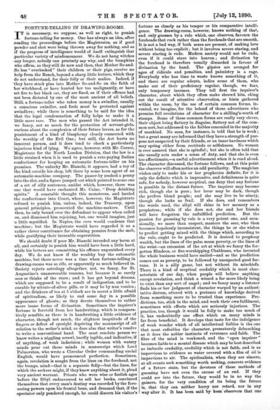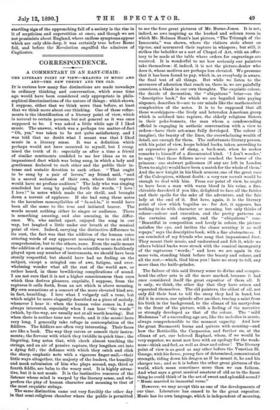FORTUNE-TELLING IN DRAWING - ROOMS.
IT is necessary, we suppose, as well as right, to punish fortune-telling for money. One has always an idea, after -reading the proceedings before the Magistrates, as if good powder and shot were being thrown away for nothing, and as if the progress of intelligence would of itself extinguish that particular variety of misdemeanour. We do not hang witches -any longer, nobody can precisely say why, and the bumpkins who affirm, as they still do now and then, that Mother So-and- So has "overlooked" their children or their pigs, receive no help from the Bench, beyond a sharp little lecture, which they do not understand, for their folly or their malice. Indeed, if -they have stuck pins into Mother So-and-So on the faith of ter witchhood, or have hunted her too malignantly, or have set fire to her black cat, they are fined, as if their offence had -not been dictated by one of the most ancient of all beliefs. 'Still, a fortune-teller who takes money is a swindler, usually - a conscious swindler, and fools must be protected against swindlers; while there is something to be said for the idea • that the legal condemnation of folly helps to make it a little more rare. The men who passed the Act intended it, -we fancy, not so much for the protection of servant-girls, curious about the complexion of their future lovers, as for the punishment of a kind of blasphemy closely connected with the worship of the Evil One ; but still, the Act hurts no innocent person, and it does tend to check a particularly Injurious kind of lying. We agree, however, with Mr. Corser, 'Magistrate for the North London Division, that the law is a little strained when it is used to punish a rate-paying Italian confectioner for keeping an automatic fortune-teller on his premises. The unlucky Mr. Bianchi, it appears, had a toy of the kind outside his shop, left there by some keen agent of an automatic-machine company. The passer-by pushed a penny into the slot, and a figure jumped out which pointed to some one of a set of silly sentences, amidst which, however, there was -one that would have enchanted Mr. Caine, "Drop drinking spirits." A constable thought this monstrous, and hauled -the confectioner into Court, where, however, the Magistrate refused to punish him, unless, indeed, the Treasury, upon general principles, prosecuted the machine-makers. Until then, he only bound over the defendant to appear when called .on, and dismissed him rejoicing, but, one would imagine, just -a little mystified. In Naples, the cura would condemn that machine ; but the Magistrate would have regarded it as a -rather clever contrivance for obtaining pennies from the mob, while gratifying their incurable superstition.
We should doubt if poor Mr. Bianchi intended any harm at all, and certainly to punish him would have been a little hard, while his betters are committing his offence unpunished every day. We do not know if the wealthy bay the automatic machine, but there never was a time when fortune-telling in drawing-rooms was so rife, or apparently so much believed in. 'Society rejects astrology altogether, not, we fancy, for St. Augustine's unanswerable reasons, but because it so rarely zees or thinks of the stars ; and it has got beyond dreams, -which are supposed to be a result of indigestion, and to be curable by nitrate-of-silver pills, or it may be by nun vomica ; and the drinkers of tea at 5 o'clock are in secret ,a little afraid 'of spiritualism, as likely to end some day in a possible -appearance of ghosts ; so they devote themselves to rather more inane forms of divination. Sometimes the inquirer's fortune is foretold from her handwriting, which is compara- tively sensible, as there is in handwriting a little evidence of character, though not much, the slightest inaptitude of the fingers or defect of eyesight depriving the manuscript of all -relation to the writer's mind, as does also that writer's resolve 'to write a conventional hand. The most resolute person we 'know writes a niggling scrawl, hardly legible, and indicative, if of anything, of weak indecision ; while women with watery minds pour out those minds in _manuscript which Lord -Palmerston, who wrote a Circular Order commanding uncial • English, would have pronounced perfection. Sometimes, again, revelation is sought from the lines on the forehead, not -the bumps, mind—that is a separate folly—but the lines, for -which the seekers might, if they knew anything about it, plead -very ancient warrant. Priests who were wise or foolish ages before the Sibyl endeavoured to sell her books, convinced themselves that every man's destiny was recorded by the fore- -seeing powers upon his frontal bone, and dreamed that, if the spectator only pondered enough, he could discern his visitor's fortune as clearly as his temper or his comparative intelli- gence. The drawing-room, however, knows nothing of that, and only guesses by a rule which, one observes, favours the foreheads that nick rather than the foreheads that are smooth. It is not a bad way, if both sexes are present, of making love without being too explicit ; but it involves severe staring, and severe staring is rude. Modern society would not be rude, even if it could stare into heaven ; and divination by the forehead is therefore usually discarded in favour of divination by the hand. The gipsies are avenged for ages of ridicule and penalties, and palmistry is a rage. Everybody who has time to waste knows something of it, and there are regular adepts, ladies some of them, who make out of their proficiency regular, though, we fear, only temporary incomes. They tell first the inquirer's character, about which they often make shrewd hits, eking out the result of attentive observation, or hints gathered within the room, by the use of certain common forms, in- vented, we imagine, for the behoof of those advertisers who promise full revelations of character for a shilling's-worth of stamps. Some of these common forms are really very clever, their object being flattery in disguise, flattery not of the com- mon sort, but addressed to the foibles concealed in the majority of mankind. No man, for instance, is told that he is weak ; but a great many are informed that they have a strength of pur- pose not suspected by their friends, or an inner hardness which may spring either from rectitude or selfishness. No woman is ever assured that she is spiteful ; but she is often told that she usually acts under a sense of duty, and that she is even too affectionate,—a useful advertisement when it is read aloud. The character discussed, the fortune follows, and at this point the observer will often notice an odd peculiarity. The magician wishes only to make his or her prophecies definite, for it is only the definite which is impressive, and definiteness is quite safe, for nobody, however sceptical, can deny that any fortune is possible in the distant future. The inquirer may become rich, though she is poor ; her lover may be dark, though she prefers blond people ; and she may live to be ninety, though she looks so frail. If she does, and remembers the words used, the sibyl will shine in her memory as a prophetess ; while if she does not, she and her friends will have forgotten the unfulfilled prediction. But the passion for guessing by rule is a very potent one, and occa- sionally, we more than suspect, masters the seer, who then becomes hopelessly inconsistent, the things he or she wishes to predict getting mixed with the things which, according to the rule, ought to be predicted. It is desired to prophesy wealth, but the lines of the palm mean poverty, or the lines of the wrist—an extension of the art at which we fancy the for- gotten Hindoos, or fire-worshipping Chaldeans, who invented the whole business would have smiled—and so the prediction comes out as poverty, to be followed by unexpected good for- tune. It is a silly game, but not without its mischiefs. There is a kind of sceptical credulity which is most char- acteristic of our day, when people will believe anything except revelation, and think a wizard a far more likely being to exist than any sort of angel ; and we fancy many a listener finds his or her judgment of character warped by an authori- tative dictum, uttered with a pretence of knowledge derived from something more to be trusted than experience. Pre- dictions, too, stick in the mind, and work their own fulfilment, sometimes with effects which are seriously injurious. The practice, too, though it would be folly to make too much of it, has undoubtedly one effect which on many minds is far from beneficial. It develops that taste for the indulgence of weak wonder which of all intellectual foibles is the one that most enfeebles the character, prematurely debauching as it does the nobler instincts of reverence and faith. The fibre of the mind is weakened, and the "open inquirer" becomes liable to a mental disease which may be best described as imbecile credulity, credulity which is not faith, and is as impervious to evidence as water covered with a film of oil is impervious to air. The spiritualists, when they are sincere, at all events seek something worth seeking, concrete evidence of a future state, but the devotees of these methods of guessing have not even the excuse of an end. If they could see into the future, they would be in no way the gainers, for the very condition of its being the future is, that they can neither hurry nor retard, nor in any way alter it. It has been said by keen- observers that one
startling sign of the approaching fall of a. society is the rise in it of scepticism and superstition at once; and though we are not pessimists about England, where endless symptoms appear which are only skin-deep, it was certainly true before Rome fell, and before the Revolution engulfed the admirers of Cagliostro.



































 Previous page
Previous page